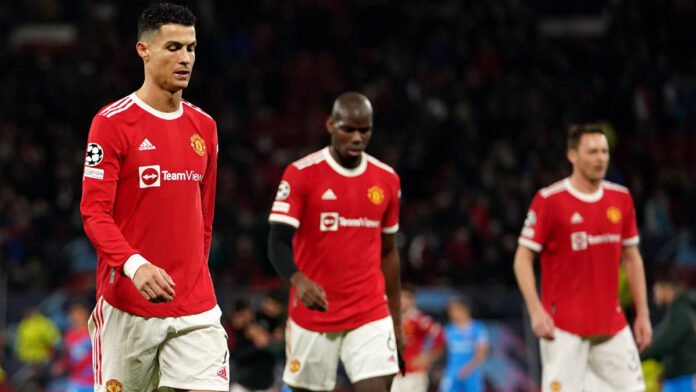Manchester United plays a major game, their best players underperform as they are outfought and outthought by their opponents, and they lose as certain as night follows day. The 1-0 Champions League triumph by Atletico Madrid at Old Trafford, which eliminated United from the championship in the round of 16, was just the same old narrative.
You’ll also be aware of the following statistics: Since 2011, United has only won two Champions League knockout ties, and there hasn’t been a home win in the knockout stages since 2014. They have only scored one goal at Old Trafford after escaping from the group stage since that 3-0 triumph over Olympiakos under David Moyes eight years ago.
Renan Lodi’s 41st-minute goal on Tuesday was just the latest hammer blow for modern-day Manchester United, a European heavyweight that has been pushed to the canvas more times than they like to remember since Sir Alex Ferguson retired in 2013.
With United, there are no shocks anymore, only ruthless predictability. They wilt when the heat is on, and it will take more than a new manager and another so-called “culture reset” this summer to put the brakes on the club and steer it in the correct path. But how did we get here? United has spent £1.4 billion on transfers in the last ten years, with only Chelsea and Manchester City spending more. In exchange for their investment, those two teams have won a slew of big trophies, but United has been without silverware for the last five years, dating back to its success in the 2017 Europa League under Jose Mourinho.
Spending money is one thing; making it pay off is quite another, and United’s inability to do so against Diego Simeone’s Spanish champions on Tuesday was a major role in their elimination.
United’s £89.1 million midfielder Paul Pogba started the club’s most important game of the season on the bench because interim manager Ralf Rangnick doesn’t trust the France international to be defensively disciplined enough to play in a two-man midfield.
And, despite the club pursuing a late equaliser, captain Harry Maguire, the world’s most expensive defender at £85 million, was removed to the delight of United supporters in the final seconds because Rangnick decided it was a better bet to pull him off and replace him with midfielder Juan Mata.
Aaron Wan-Bissaka, a £50 million right-back, did not even start, but the former Crystal Palace defender has only started six occasions since Rangnick took over in December because he is considered a liability with the ball at his feet.
Marcus Rashford, who was nurtured via United’s junior system and cost the club nothing, has now become one of the club’s brightest players. Despite this, he began the season on the bench following a long time of inactivity.
So, in a game that was critical to United’s chances of winning a trophy and qualifying for next season’s Champions League — a game in which they needed all of their best players on the pitch — Pogba, Rashford, and Wan-Bissaka were benched, and Maguire was denied the chance to lead his team’s desperate search for a goal in the closing stages.
When a manager is unable to rely on his most important players in the most important games, it reflects the club’s wastefulness in the transfer market as well as their incapacity to motivate or improve them on the training field.
It would be unfair to hold Rangnick responsible for this. Despite the fact that the German coach has only been at United for three months, he has already managed to get the most out of winger Jadon Sancho and central midfielder Fred. Rangnick has also been rewarded for his confidence in Anthony Elanga as a striker and has been pragmatic enough to replace Wan-Bissaka with Diogo Dalot.
However, against a side as experienced as Atletico Madrid in the Champions League, you just need your top players to show up. Long before Rangnick came, though, Pogba, Rashford, Wan-Bissaka, and Maguire had been letting United down.
Both Mourinho and Ole Gunnar Solskjaer struggled to get the best out of Pogba — Mourinho dropped him for a loss against Sevilla at this stage four years ago due to his defensive shortcomings — while the rest of the team is now paying the price for a lack of coaching and development during Solskjaer’s three-year reign.
Many athletes are suffering from deep-seated malaise, but this is hardly fresh news. During the disastrous times of Moyes and Louis van Gaal, the same might have been stated four years ago or even farther back.
Finally, United has evolved into a club that suffocates the brilliance and personality of its finest players, and nothing will change until that occurs.
Atletico were there to be taken, with Simeone’s club lagging behind the sides who reached the Champions League final in 2014 and 2016, but once they took the lead, their win was never in question since United kept to their dreadful script once again.













